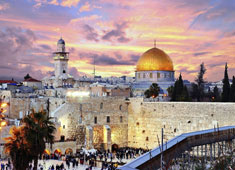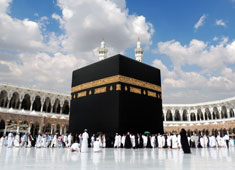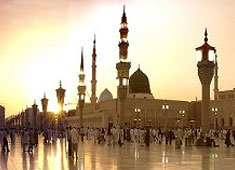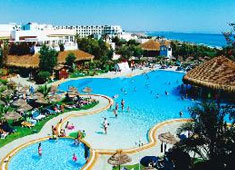Health During the Hajj
HEALTH DURING HAJJ
The pilgrimage is a rite not only physically tiring but also risky.
Huge gathering of pilgrims – often coming from tropical zones, intense crowding, compulsory local food (the bringing in of foodstuff is forbidden), as well as exhausting climatic conditions, are factors, among others, favorable to the direct or indirect transmission of infectious diseases.
Hygiene precautions should prevail for Hajj as for Umrah and are, therefore, imperative prerequisites to any journey to Saudi Arabia.
In respecting the recommended precautions of hygiene, you limit the risks.
Vaccines
A certificate of vaccination dating of between three years and ten days is required from all the pilgrims going to Mecca.
It is available at the approved vaccination centres (TAU: temporary authorization of use). You cannot thus be inoculated at your regular doctor's.
Unfortunately, pilgrims often disdain all other vaccinations not decreed compulsory by the Saudi authorities. Vaccines against the following diseases are strongly recommended:
Recommended vaccines
Meningococcal meningitis:
The tetravalent vaccine is the one you absolutely have to make. It protects against the serogroups A, C, Y and W135. However, pilgrims, although inoculated, can develop meningitis and pass it on to the others.
The meningitis is the inflammation of meninges, mostly having an infectious origin. It is thus advisable to be attentive to the appearance of any signs suggesting meningitis such as: fever, intense headaches, important discomfort caused by light, neck pain or stiffness, nausea and vomiting.
Yellow fever: the vaccine against the yellow fever is recommended but not compulsory, except for the pilgrims coming from endemic zones. Saudi Arabia was indeed, classified by the WHO as a risky country; it’s an acute viral disease with mosquito bites as a main transmitting mode.
Typhoid: not compulsory but well recommended; it’s an infectious disease caused by a bacterium of the class of salmonellas.
Hepatitis A: quite recommended especially if the subject is not naturally immunized (rather rare); it’s a liver disease which is due to an RNA virus of the family of picornavirus, mainly passed on by the ingestion of water or soiled food.
Pneumococcus: very often, nothing but the pilgrim’s age and pathologies would justify this vaccination. The pilgrimage is an important vaccinal opportunity; species of bacterium, important pathogenic agent in Man.
The Flu: not compulsory (for the visa) but imperative; frequent and contagious infectious disease caused by three RNA viruses of the family of Orthomyxoviridae.
The tetanus: serious illness, acute and potentially mortal caused by the contamination of a wound by spores of tetania Clostridium, bacillus often found in the ground.
Paris:
Air France center of vaccination: 148, rue de l' university - 75007 Paris - Phone: 01.43.17.22.00 Hospital of the Institute Pasteur: 209, rue de Vaugirard - 75015 Paris - Phone: 01.45.68.81.99 U.N.E.S.C.O: Place de Fontenoy - 75007 Paris - Phone: 01.45.68.08.58
Hospital complex Cochin: 27, rue du Faubourg Saint-Jacques - 75014 Paris - Phone: 01.42.34.14.98 Val of the Marne
Airport of Paris: medical service South Orly 103 - 94386 Orly Terminal - Phone: 01.49.75.45.14
The North:
Pasteur institute: 1, rue du Professeur Calmette - 59019 Lille cedex - Phone: 03.20.87.79.80
Regional Hospital of the Scrive armies: 43, rue de l' Hôpital Militaire - 59998 Lille Armées - Phone: 03.20.42.38.29 or 36.36
Guyana:
Center of prevention and vaccination: rue Léonce-Porré - 97354 Remire-Montjoly - Phone: 05.94.35.40.40
Health center: 97330 Camopi - Phone: 05.94.37.44.02
All the centres of France:
Http: // www.muskadia.com
http: // www.diplomatie.gouv.fr
Adults are recommended to update their vaccinations against:
The diphtheria: contagious infectious disease which is characterized by the formation of false membranes in the entrance of respiratory tracts.
The poliomyelitis: acute contagious infectious disease, passed on through the digestive way (from water and contaminated food);
A reminder every 10 years to re-stimulate the immune system!!
The whooping cough: bacterial respiratory infection, causing little or no fever, of the lower respiratory tree, but evolves on the long run and highly contagious.
If, upon your arrival in the kingdom, you do not present a certificate of vaccination, they shall inoculate you there and you will be, if necessary, isolated and under medical supervision for 6 days, according to the prescriptions of the Saudi authorities.
If you have a passport from a Muslim country, the vaccination is in that case free in the local representations of these countries.
Water and food supplies
Tap water presents a potential risk, avoid drinking it.
The travel between Medina and Mecca is made generally by bus and can take several hours (up to 10 hours). On the road, you have no guarantee to find neither clean food nor toilet. Think of well preparing yourself and resting before this journey.
Two alternatives are available: mineral bottled water and, naturally, the water of Zamzam.
Nevertheless, you’d better keep your bottle of water within reach. The journey between Mecca and Medina is very tiring. It‘s often by bus and can last up to 10 hours. Using an atomizer of fresh water is therefore highly recommended.
In Mecca, and around the Haram, avoid the restaurants where the hygiene looks lacking.
Check the cleanliness of the restaurant before ordering and wash your hands thoroughly before every meal. (It is recommended to have one’s personal soap in the bag.)
As for food, based generally on rice, avoid eating it up and consume only what you are used to. You’d better eat only well cooked meat and fish, preferably served hot. Cook vegetables and eat peeled fruit. Also, remember to boil milk.
Older people
The pilgrim will be subject to rough, sometimes dangerous physical constraints especially older people.
It is about a hard experience. Doctors have to know its constraints so as to pass on, the best possible, their messages of warning to the pilgrims who travel to Mecca every year.
The risk of deep vein thrombosis - one of the two appearances of the thrombophlebitis disease: a clot forms in the venous network of the lower limbs ( venous thrombosis) and can get loose and migrate in a lung artery (pulmonary embolism) - is undoubtedly maximal for older people suffering from venous incapacity or from cardiac problems.
Before leaving, visit your regular doctor and explain to him/her the conditions of your pilgrimage. He/She can well advise you how to take care of yourself and avoid possible complications.
Warn your head of group if you are affected by some disease, an allergy or a handicap.
Beware of medicine causing drowsiness, because if you’re going out, you could fall. Speak about it with your doctor. Learn the names of your medicine by heart, or write the list and hand a copy to the doctor of the group.
Beware you who have blood pressure. Certain anti-flu medicines like nose clearing inhalers increase heart thump; tell your doctor about it.
Those who suffer from diabetes do not have to stop eating during daytime, and under pretext of having done exercise during the day, eat a whole salad bowl of fruit in the evening. Doing so will only make their rate of sugar rise at once. Take four or five small meals a day and consult your doctor.
Those who take medicines for diabetes, it is recommended not to have a nap in the afternoon, to pay much attention to wounds, to check for bleeding when being trampled, and to pay much attention to the sun – no doubt your worst enemy during your pilgrimage. Think of covering your head when possible.
Handicap
A handicapped pilgrim or a pilgrim suffering from some incapacitating handicap not allowing him/her to achieve pilgrimage can be substituted by another Muslim who will do it on his/her behalf.
Saint Koran stipulates clearly that only the people who have the physical and financial abilities are instructed to achieve Hajj.
However, to allow those people suffering from a handicap to undergo this unique spiritual experience, several solutions facilitating that task are possible.
There are arrangements for the handicapped at the airport of Jeddah, arrangements with private cab companies for the persons with reduced mobility or moving in wheelchair, and some hotels of high status are also equipped to receive these people.
Escalators and walkways are fitted in the Great Mosque of Mecca to allow people in wheelchairs to move easily from one floor to the other.
There also exist support services for people with reduced mobility, proposing wheelchairs, help, and support for the handicapped and older persons for an average sum of around 60 Euros.
It is imperative, all the same, that every handicapped person intending to achieve Hajj consults his/her travel agent and the service provider in the Kingdom before making a reservation. That person should also demand of the travel agent a written confirmation detailing all the particular preparations being set up for him/her.
Precautions to be taken
In Medina, avoid visiting Rawdha during daytime. The best time to go is in the evening from 9:00 pm to midnight.
In Mecca, leave to the mosque a few hours before the prayers time so as to find a convenient spot.
Pay particular attention to the traumatic risks (shoving).
Near Qaba, a hospital offers free care and medicines. An office of the French Foreign Ministry opens every year, generally in Djeddah, to arrange for the French pilgrims.
Pilgrims are forbidden from cutting their nails, making any movement susceptible to cause bleeding whatever small. Therefore, for example, any dental treatment is forbidden: better consult dentist in advance.
Personal measures for protection against insect bites are highly recommended. So is a cream against fungus if you have a sensitive skin. Etc.
Hajj/Umrah health centers in Saudi Arabia:
There are numerous health centers in the Two Holy Cities and the Holy Shrines. Some of these centers offer their medical services throughout the year whereas others operate only during Hajj seasons. All these centers receive and treat patients.
There are 294 centers, including:
- 42 Primary Health Care Centers in Arafat.
- 30 Primary Health Care Centers in Mina.
- 7 Primary health Care Centers in Muzdalifah. Each of these centers contains 16 beds for receiving heat exhaustion cases.
- 27 Permanent Primary health Care Centers in Makkah Al-Mukarramah.
- 45 Seasonal Primary Health Care Centers at the inlets of the Holy Capital, the Al-Hijrah Road and Land Pilgrims parking areas.
- 38 Supporting Health Units in Al-Madinah Al-Munawwarah devoted to the pilgrims, five of which are inside the Prophet's Mosque.
- 133 Health Centers in various parts of Al-Madinah Al-Munawwarah and land routes leading to it.
- 5 Primary Health Care Centers inside the Holy Mosque.
- 84 Seasonal Primary Health Care Centers in Makkah Al-Mukarramah, five of which are surrounding the Al Jamarat flyover bridge.
Click Here to read the Hajj and Umrah latest news













 TUNIS
TUNIS Casablanca
Casablanca




 France
France Morocco
Morocco Saudi Arabia
Saudi Arabia Tunisia
Tunisia